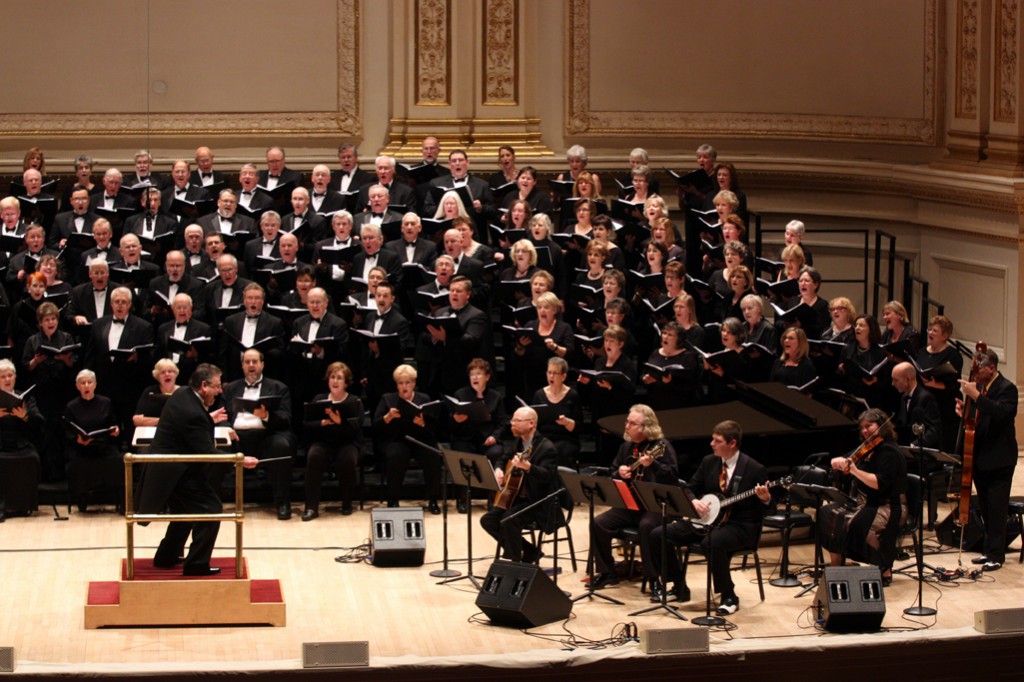Distinguished Concerts International New York (DCINY) is an organization that gives talented musicians and vocalists an opportunity to perform in world-class venues, often performing new works of both established composers and up-and-coming talents. Today’s concert was no exception; works from Mozart, Haydn, and John Rutter, with the New York premiere of Calling All Dawns, from new talent Christopher Tin, were on the program.
In what might have been called a pre-concert performance, Anonymous 4 opened with a set of six pieces done with the skill that has made then renowned. Possibly in keeping with the “anonymous” ideal, any information about these six pieces was withheld. It was a serious omission not to have the works named, in spite of the program noting “selections to be called from the stage”. In this day and age when everything should be done to enlighten audiences and enhance the concert experience, a golden opportunity to foster further interest was lost.
Mozart’s Regina Coeli K. 276 is a jubilant work that honors the Virgin Mary. The trumpets and timpani lend the otherwise largely string orchestration a festive quality that is in keeping with the celebration of Easter. There is a strong reminder of Handel’s Hallelujah chorus, although it is not known whether Mozart had seen Handel’s score prior the composition. Guest conductor Eric A. Johnson led a solid performance that featured High School and University singers from Illinois, Oregon, and California. Next came the Te Deum for the Empress Marie Therese of Franz Joseph Haydn. Johnson styled this performance with skill, conveying the work’s regal air and showing considerable attention to detail. The transitions to C minor and back to C major were particularly sensitively done. It seemed that conductor, orchestra, and chorus gained in confidence as the performance progressed.
John Rutter (b. 1945) describes his Gloria as a three-movement symphony that is “exalted, devotional, and jubilant by turns”. Guest Conductor Geoffrey Paul Boers took the podium and wielded his baton with the demeanor of a wizard preparing to hurl thunderbolts. From the arresting opening bars, one was put on notice that the Distinguished Concerts orchestra was pulling out all the stops, from the stunning brilliance of the brass playing to the electric energy in the percussion. It was especially enjoyable for this listener to hear these players shine so brightly, as I have almost always found them to be the equals of any I have heard anywhere. The exuberant orchestra overshadowed the chorus in the outer movements, where the latter simply did not project enough volume. Interestingly enough, the singers’ than full sound turned out to be a blessing in the 2nd movement, where the chorus was actually quite radiant. In spite of these issues, it was an exciting, dynamic, and passionate performance that ended the half with a splash.
It must be a unique occurrence for a large-scale work to have its genesis from a theme written for a video game, but this is the case for Calling All Dawns, which was the only work on the second half. In conversation with Jonathan Griffith, composer Christopher Tin (b. 1976) told the story of how Calling All Dawns came to be. The opening movement, Baba Yetu, was composed as the theme for the computer game Civilizations IV. It was so popular in the gaming world that the music went “viral”, with countless requests for more pieces from the composer. Tin was inspired to write a large work that he described as a “four-year labor of love”. Calling All Dawns is a forty-five minute, twelve-movement work, with each movement in a different language (Swahili, Japanese, Mandarin, Portuguese, French, Latin, Irish, Polish, Hebrew, Farsi, Sanskrit, and Maori). The idea of a multi-cultural world where we are more similar than different was Mr. Tin’s stated goal. Mr. Tin has a gift for writing music that is immediately accessible in its tonal consonance, rhythmically vital, and appealing to the emotions. It is easy to understand why his music is so popular. One can detect similarities to other composers’ work (e.g. Karl Jenkins, Henryk Górecki in his Third Symphony, and Mike Oldfield, especially his Music of the Spheres), which might cause some to suggest the music is derivative, but I prefer the idea of a composer finding his voice. All these caveats aside, the pairing of Tin and DCINY is an ideal partnership, and it will be interesting to hear Mr. Tin’s next work, which DCINY will be premiering in 2014.
Conductor Jonathan Griffith was the master of the situation, as is the norm for this consummate leader and musician. Any composer should be thrilled to have him at the helm when his works are played. The orchestra had already been excellent this afternoon, but they saved the best for the last in a performance that was done with style and grace. The supporting chorus, with singers from Australia, the United Kingdom, Vermont, Illinois, Pennsylvania, and New York, was vibrant throughout with a strong performance that was not wanting in volume or passion. It was a joy to see the constantly changing soloists, from Anonymous 4, to others including members of the chorus who came forward and offered passionate performances. They were all stars today. When two Maori in tribal dress entered the stage in the final movement and not only chanted the Maori lyrics, but did a ritual dance, it was that special DCINY “touch” that I have come to expect from this fine organization. The audience reacted after the final notes with the loudest and longest standing ovation I have ever heard at any concert. Mr. Tin was called to the stage and the ovation became deafening. It must have been one of the proudest moments in his life and it was wonderful to see. It’s an image I will not soon forget. Congratulations to DCINY for another winning performance.

